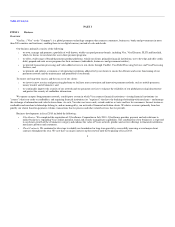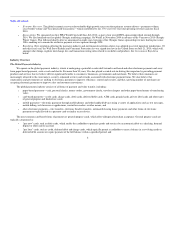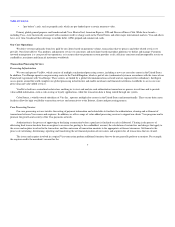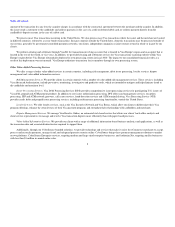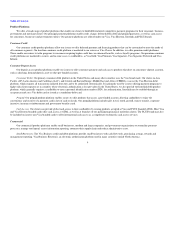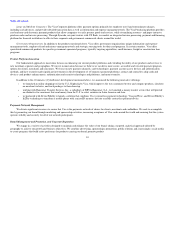Visa 2010 Annual Report Download - page 15
Download and view the complete annual report
Please find page 15 of the 2010 Visa annual report below. You can navigate through the pages in the report by either clicking on the pages listed below, or by using the keyword search tool below to find specific information within the annual report.
Table of Contents
Government Regulation
General. Government regulation affects key aspects of our business. We are subject to regulation of the payments industry in many countries in which
our cards are used. Our clients are also subject to numerous regulations applicable to banks and other financial institutions in the United States and elsewhere,
and consequently such regulations affect our business. In recent years, our business has come under increasing regulatory scrutiny.
Network Exclusivity and Routing. Issues relating to network exclusivity and to interchange fees associated with open-loop payments systems such as
ours are being reviewed or challenged in various jurisdictions in which our cards are used. Most notably, the Wall Street Reform and Consumer Protection
Act recently enacted in the United States includes provisions that will regulate the selection of payment networks by issuers and the routing of debit
transactions by retailers. This may result in the routing of debit transactions onto competitive networks, potentially reducing the processing fees we earn on
debit transactions.
Interchange Fees. The U.S. Wall Street Reform and Consumer Protection Act also established regulation and oversight by the U.S. Federal Reserve
Board of debit interchange rates and certain other network industry practices. In addition, the Federal Reserve now has the power to regulate network fees to
the extent necessary to prevent evasion of the new rules on interchange rates. Although we administer the collection and remittance of interchange
reimbursement fees through the settlement process, we generally do not receive any portion of the interchange reimbursement fees. Interchange
reimbursement fees are often the largest component of the costs that acquirers charge merchants in connection with the acceptance of payment cards.
Interchange reimbursement fees are an important driver of system volume.
Interchange fees and related practices also have been or are being reviewed by regulatory authorities and/or central banks in a number of jurisdictions.
Most notably:
• The Reserve Bank of Australia, or RBA, has promulgated regulations under legislation enacted to give it powers over payments systems. One of
the regulations controls the costs that can be considered in setting interchange reimbursement fees for Visa credit and debit cards, but it does not
regulate the merchant discount charged by any payment system, including competing closed-loop payments systems. The RBA has concluded
that conditions have not yet been met for removal of interchange regulation and so will continue regulatory oversight of interchange.
• In June 2009, the Canadian Senate issued a report with the non-binding recommendations that debit interchange be set at zero for three years, that
merchant surcharging be permitted in Canada and that rules requiring that Visa-accepting merchants honor all cards be modified. Canada's
Competition Bureau has opened a civil inquiry to review interchange and certain Visa rules, including those relating to surcharging and honoring
cards. In addition, the Canadian Ministry of Finance has proposed a voluntary "Code of Conduct" on related issues for payment card industry
participants in Canada.
• In March 2009, the Central Bank of Brazil issued a joint report that criticized, amongst other things, Brazil's current acquiring structure, Visa's
no-surcharge rule, and the current system of setting interchange rates. See also Note 22—Legal Matters to our consolidated financial statements
included in Item 8 in this report.
Data Protection and Information Security. Aspects of our operations and business are subject to privacy regulation in the United States and elsewhere.
For example, in the United States, our clients and we are respectively subject to Federal Trade Commission and federal banking agency information
safeguarding requirements under the Gramm-Leach-Bliley Act. The Federal Trade Commission's
14



